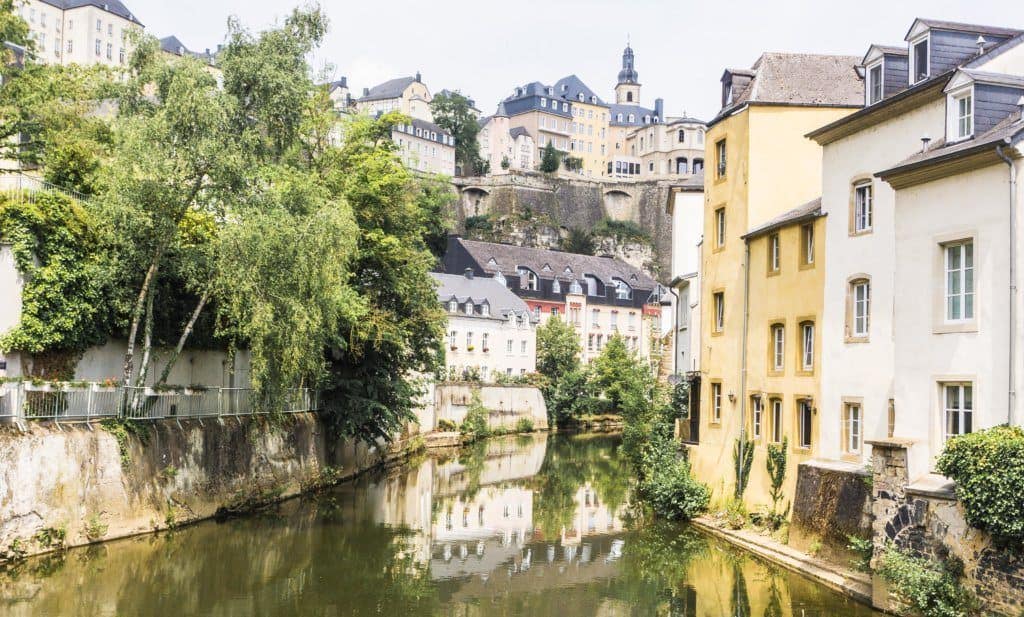20+ Fun, Cool, Weird & Interesting Facts About Luxembourg
Last Updated on 9th January 2024 by Sophie Nadeau
This post may contain affiliate links. Please check out my privacy policy and disclosure for more information.
Luxembourg is a tiny landlocked country in the very heart of Europe. Sandwiched between Belgium, France, and Germany, this is one beautiful destination you won’t want to miss on your next visit to Europe. And if you’re looking for some quirky trivia, then here are some pretty fun, cool, weird, and interesting facts about Luxembourg!

Contents
- Best facts about Luxembourg
- #1 Luxembourg is the last Grand Duchy in the world
- #2 Luxembourg has 3 official languages
- #3 Luxembourg’s cuisine is a mix of French and German
- #4 Luxembourg is one of the smallest countries in the world
- #5 Luxembourg is home to a number of vineyards
- #6 Luxembourg is a landlocked country
- #7 There are only a handful of universities in Luxembourg!
- #8 Restaurant Chiggeri holds a world-record for the longest wine list in the world
- #9 Luxembourgish National Day is on the 23rd of June
- #9 Luxembourg is home to wild boars
- #10 Luxembourg dates back to 963
- #11 The oldest city in Luxembourg is Echternach
- #12 Luxembourg’s motto is mir wëlle bleiwe wat mir sinn
- #13 There are 17km worth of underground tunnels cut out of the rock beneath Luxembourg City
- # 14 Luxembourg has the smallest population size in Europe
- #15 Luxembourg was one of the original members of the European Union
- #16 Luxembourg City is a UNESCO world heritage site
- #17 There are well over 100 castles in Luxembourg
- #18 Public transport is free in Luxembourg
- #19 Luxembourg has the highest minimum wage in Europe
- #20 Luxembourg has a high rate of car ownership
- #21 Over a third of Luxembourg is covered in forests
- Enjoyed reading these facts about Luxembourg? Pin this article now, read it again later:
Best facts about Luxembourg
#1 Luxembourg is the last Grand Duchy in the world
Once upon a time, there would have been several Grand Duchies located across Europe, including several in what is now Germany. Today, the only remaining Grand Duchy is that of Luxembourg, meaning that the official head of state is called ‘Grand Duke’ or ‘Grand Duchess’.
#2 Luxembourg has 3 official languages
Due to its position between such a melting pot of countries and cultures, Luxembourg actually has three official languages. These are German, French, and Luxembourgish. Curious as to what Luxembourgish is like? Here’s our guide to some basic Luxembourgish words and phrases.
#3 Luxembourg’s cuisine is a mix of French and German
Due to significant influences from its nearby neighbours, Luxembourgish cuisine is a beautiful blend of French cuisine meets German dishes. Some food which is typical from the region includes plum tart, potato pancakes, and a whole variety of hearty soups and meat-heavy platters.

#4 Luxembourg is one of the smallest countries in the world
Of all the smallest countries in Europe, Luxembourg ranks as the 7th smallest and has a surface area of 2,586 km², making the little country easy to explore over the course of several days. Luxembourg is so small that it’s even smaller than the state of Rhode Island in the US.
#5 Luxembourg is home to a number of vineyards
When you think of wine from Europe, you probably think about French, Spanish, Italian, and even German wines. What you may well have not heard of is Luxembourgish wines. However, there are a number of wines produced in the Moselle region.
Crémant de Luxembourg is a sparkling wine that comes in rosé or white and has even won a number of awards. Other iconic wines to be produced in Luxembourg include Riesling (a fruity wine with mineral notes) and Rivaner, which is a cross between Riesling and Sylvaner grapes.
#6 Luxembourg is a landlocked country
The Grand Duchy of Luxembourg has no direct access to a sea or ocean and is instead surrounded on all sides by other countries. The little country is sandwiched between Germany, France, and Belgium. Due to the high cost of living in the pint-sized country, many people live in nearby France and commute to work in Luxembourg itself.

#7 There are only a handful of universities in Luxembourg!
The two most famous higher education institutions are the University of Luxembourg and Sacred Heart University Luxembourg.
#8 Restaurant Chiggeri holds a world-record for the longest wine list in the world
If you’re a fan of wine, then you’ll be in luck should you opt to visit Luxembourg. Restaurant Chiggeri, which is set against the backdrop of a historic turreted building in Luxembourg city itself has held the title of having the world’s longest wine list since 2009. Discover more about the world record here.
#9 Luxembourgish National Day is on the 23rd of June
Each year, the Grand Duke’s Birthday is celebrated on the 23rd of June. However, you should note that neither the current Duke, Henri, nor has any other ruler in Luxembourg’s history has had their actual birthday on the 23rd of June. This is purely symbolic so that people can make the most of the summer weather on the public holiday.

#9 Luxembourg is home to wild boars
As a landlocked country filled with lots of green spaces, expansive lakes, and mountainous areas, it shouldn’t surprise you that there’s lots of local wildlife to be found in the Luxembourgish countryside, including deer and even wild boars.
#10 Luxembourg dates back to 963
The very beginnings of the Grand Duchy go all the way back to the 10th-century, when Siegfried, Count of Ardennes, acquired what is now Luxembourg Castle from an exchange with an Abbey in Trier (a city in what is now Germany). At the time, the fort was known as Lucilinburhuc (which literally translates into English as ‘Little Fortress’). The Saxon name roughly translates into English as ‘little Fortress’.
#11 The oldest city in Luxembourg is Echternach
The actual story of Echternach all began back in 698 when a Benedictine Abbey was established by Willibrord on a piece of land which was once inhabited by the Romans. The ruins of an impressive Roman villa can still be visited on the outskirts of Echternach to this day.
Soon enough, a thriving community sprung up around the abbey and so the historic town was born. Today, you can visit the charming town of Echternach, which is often referred to as ‘little Switzerland’ on account of its stunning scenery and many nearby hiking trails.

#12 Luxembourg’s motto is mir wëlle bleiwe wat mir sinn
The motto is in Luxembourgish and is translated into English as ‘we want to remain as we are’. The phrase refers to the fact that Luxembourgish people want to remain independent. In centuries gone by, surrounding powers have tried to dominate the Grand Duchy economically, politically, and militarily.
#13 There are 17km worth of underground tunnels cut out of the rock beneath Luxembourg City
One of the most fascinating historical aspects of Luxembourg City is that of the Bock and Pétrusse casemates. These underground tunnels were created as early as 1644 (though later additions date back to the 1700s) and were meant for defensive purposes.
During WW2, the tunnels were used as air-raid shelters and could accommodate upwards of 30,000 people. Today, the casemates of Luxembourg are classed as UNESCO world heritage and parts of them can be visited with a guide for a small fee.
# 14 Luxembourg has the smallest population size in Europe
As of January 2020, Luxembourg has a population of 626,108, making it the smallest population size n Europe. Luxembourg City has around 120,000 residents, meaning that over 1/6 people in Luxembourg live in its capital city.

#15 Luxembourg was one of the original members of the European Union
In 1951, Luxembourg was one of the six original members of the EU. The others were France, Germany, Belgium, Italy, and the Netherlands.
#16 Luxembourg City is a UNESCO world heritage site
Due to the sheer number of historic fortifications and Old Quarters, the entirety of the old part of the City of Luxembourg is listed as UNESCO world heritage. So impressive is the architecture, that the city is often given the nickname ‘The Gibraltar of the North’. This is currently also the only UNESCO world heritage site in Luxembourg.
#17 There are well over 100 castles in Luxembourg
Luxembourg has a vast array of castles, fortifications, and château in various states of repair. As well as being home to numerous ruins, plenty of castles are still in good shape and are private residences or can be visited by the public. While some estimates put the number of castles in Luxembourg as high as 130, in reality, there are probably just over 100.

#18 Public transport is free in Luxembourg
Of all the Luxembourg facts here, this is probably the number one thing you should know before visiting the land-locked country! Luxembourg is the first country in the world to offer free nationwide public transport to everyone.
Since March 1st 2020, trains, buses, and trams have been free for everyone. Journeys across the border to Belgium, France, or Germany, and first class tickets still have a fee so you’ll still need to buy tickets for these trips.
If you’re sticking to travel within Luxembourg then, because the journeys are so short, I would say that upgrading to first class probably isn’t worth it and you should stick with regular travel to save on transportation costs. Learn more about free public transport in Luxembourg here.
#19 Luxembourg has the highest minimum wage in Europe
Due to the fact that Luxembourg is one of the most expensive places to live in the world (when you factor in costs such as housing and food), the pint-sized country has the highest minimum wage in Europe. As of June 2020, minimum wage in Luxembourg is 2,141.99 EUR per month.
#20 Luxembourg has a high rate of car ownership
Luxembourg is one of the countries with the highest rate of car ownership in the world. As of 2022, there were 784 cars per 1,000 inhabitants.
#21 Over a third of Luxembourg is covered in forests
The countryside is never too far away when it comes to the Duchy of Luxembourg. Indeed, it’s estimated that around 33.6% of the land in Luxembourg is covered in forests.
Enjoyed reading these facts about Luxembourg? Pin this article now, read it again later:








